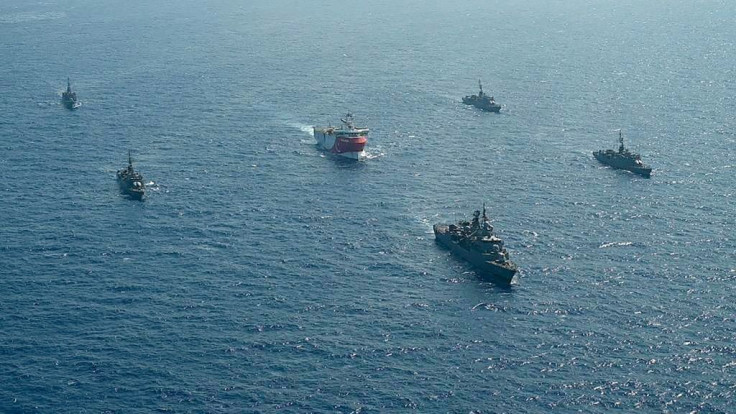Turkey Blames Greece's 'Hostile Action' As S-300 Missile System Locks On To Turkish F-16s
KEY POINTS
- Turkey said its F-16 fighter jets on a reconnaissance mission were harassed by Greece
- Turkey said Greece's action amounted to "hostile acts" under the NATO rules of engagement
- Both NATO members are embroiled in decades-old disputes over a range of territorial issues
In what it termed as "hostile action," Turkey said Greece used a Russian-made S-300 missile system based on the island of Crete to harass Turkish F-16 fighter jets that were on a reconnaissance mission over the Aegean and Eastern Mediterranean.
The incident, which is said to have happened on Aug. 23, was reported Sunday by Turkey's state-run news agency Anadolu Agency, citing defense ministry sources. Meanwhile, Greece has denied the claims made by Turkey.
Turkey has termed the action as "incompatible with the spirit of [NATO] alliance" amounting to "hostile acts" under the NATO rules of engagement. Aljazeera reported that when the S-300s target-tracking radar locked on, the Turkish F-16s were flying at an altitude of 10,000 feet to the west of Greece's Rhodes island. The Turkish planes completed their mission and returned to their bases "despite the hostile environment," the report added.
On Monday, Turkey's defense chief, Hulusi Akar, lashed out against Greece over the harassment of Turkish fighter jets. He was speaking at a Turkish Armed Forces' ceremony.
"The action of our bad neighbor (referring to Greece) needs to be seen, understood and explained. Such blatant insolence, recklessness is unacceptable," Anadolu Agency quoted him as saying.
"Unfortunately, this bad neighbor (Greece) is constantly harassing (Turkey) in various ways in the Aegean. I'd like to make it clear once again that our navy, land and air forces do not and will never compromise on any kind of harassment," Akar further said.
Last week, it was reported that Greek Air Force fighter jets placed radar locks on Turkish F-16s escorting US B-52 bombers as part of the NATO mission. Following the incident, Turkey summoned the Greek military attaché and filed a complaint with NATO.
Although Turkey and Greece are both NATO members, the countries are embroiled in decades-old disputes over a range of issues - from territorial claims in the Aegean Sea and disagreements over the airspace to exploratory drilling rights in areas of the Mediterranean Sea - that have brought them to the brink of war three times in the past half-century.
Even as Ankara accuses Greece of violating international peace agreements by militarizing islands in the Aegean Sea, Athens says it needs to defend the islands that lie close to Turkey's coast. In May, irked by growing US-Greece relations, Turkish President Recep Tayyip Erdogan dashed hopes of dialogue by cutting all ties with Greek Prime Minister Kyriakos Mitsotakis alleging that Greece had lobbied against US arms sales to his country.

© Copyright IBTimes 2025. All rights reserved.






















